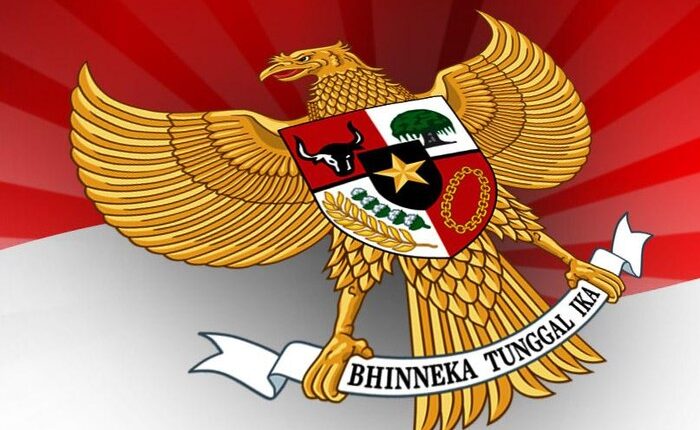Preparation of RKUHP Accommodates Pancasila Values
By: Princess Ganeswari )*
The preparation of the Draft Criminal Law (RKUHP) is very capable of accommodating the values of Pancasila as the ideology of the Indonesian nation. One of them is about the participation of the entire community in building a better country, therefore, since the beginning of the preparation of the RKUHP, the government has always accommodated all inputs from the community.
The ideology of Pancasila is in fact accommodated and accommodated in the Draft Criminal Law (RKUHP) because its application will be very adapted to the times. Itis very different from the old Criminal Code of Dutch heritage, in which it has become increasingly incompatible and found irrelevant, including also being unable to accommodate the original philosophical thinking of this nation.
In fact, national leaders have assessed and felt that the implementation of the Criminal Code of colonial heritage is important to be replaced immediately, even since 1964 a Team of Peruus of the Criminal Code Bill has begun to be formed. Then in 2004, the Drafting Team of the Criminal Code Bill was formed under Prof. Dr. Muladi, S.H. then the DPR for the 2014-2019 period then agreed on a draft of the RKUHP in making the first level of decisions.
Then in September 2019, the President of the Republic of Indonesia, Joko Widodo decided to postpone the ratification of the Criminal Code Bill and in April 2020 another discussion of the Criminal Code Bill was carried out because it was felt that there were still several things that could be improved so that they could really be appropriate and get support from all Indonesian people.
It is undeniable that the urgency of ratifying the criminal code to replace the position of the old criminal code as a legal system is already very high. This is because there have been many dynamics of social changes in law and thenature of society, so indeed to adjust to such a rapid development of the times, there must also be an update of the legal system. Thus, an independent country must have its own laws of a national nature for the sake of national pride.
Regarding this matter, the Deputy Head of the Pancasila Ideology Development Agency (BPIP), Dr. Karjono stated that it is very necessary to have a law that reflects the cultural values of a nation, while the practical reason for the importance of ratifying the RKUHP, among others, comes from the fact that usually former colonized countries inherited the laws that colonized them with their original language, which is then widely understood by the younger generation today.
It is proven indeed, in fact, the Dutch heritage Criminal Code only has the original Dutch language, while what has been applied in Indonesia itself is a translated version, and there are even several other translated versions. This sometimes causes its own problems because there are certain points that are actually multi-interpretation.
Dr. Karjono hopes that there will be a legal reform in Indonesia that has begun since the proclamation of the independence of the Republic of Indonesia through the Basic Law which cannot be separated from the foundation and at the same time the national goal. He added that the conception of Pancasila as a state ideology arose from the position of Pancasila as the basis of the state and the nation’s outlook on life which was associated with the purpose of statehood.
Pancasila is defined as a set of beliefs (a set of beliefs) derived from experiences in the life of the Indonesian nation and believed to be true because it is able to maintain the sustainability of the life of the Indonesian nation and become a guiding star (dynamic leitstar) to realize the ideals of the state as written in the Preamble to the 1945 Constitution of the Republic of Indonesia, namely Independence, unity, sovereignty, justice, and prosperity.
Pancasila as the fundamental ideology of this nation must be framed through a sense of nationalism. This effort is expected to string together unity and unity in Indonesian diversity. This is also an alternative solution in overcoming the map of the nation’s problems that are mapped in the eradication of Pancasila.
In Article 37 of the Constitution of the Republic of Indonesia of 1945, it is explained that changes in the constitution that can be changed to the torso or articles. Meanwhile, in the Preamble, no changes must be made, meaning that Pancasila is eternal on the earth of the Republic of Indonesia.
Meanwhile, the Rector of the Indonesian Christian University (UKI), Dr. Dhaniswara K Harjono hopes that all discussions that have been opened wide by the government through the Ministry of Law and Human Rights to be able to absorb all the aspirations of all elements of Indonesian society have been able to produce many recommendations that are very beneficial for the nation and state, especially in the ratification of the RKUHP which is considered to have been running with the values of Pancasila.
Community involvement in the preparation of the RKUHP is an effort to gather inputs from various parties to equalize the public’s perception of the articles in the RKUHP. The preparation of this RKUHP is an accountability for the process of forming laws and regulations which is carried out transparently and involves the community.
The creation of serious public participation and involvement that must have three important prerequisites in it, including the right to be heard, the right to be considered, and the right to be considered.
Indeed, Pancasila is the source of all sources of law and even one pillar of the other four pillars of nationality. Therefore, with the ratification of the RKUHP which is a reflection of Pancasila, it is hoped that it can accommodate all differences in society.
)* The author is a contributor to Ruang Baca Nusantara
